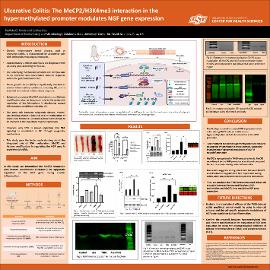| dc.contributor.author | Pande, Radhika D. | |
| dc.contributor.author | Das, Subhas | |
| dc.date.accessioned | 2023-11-02T20:47:16Z | |
| dc.date.available | 2023-11-02T20:47:16Z | |
| dc.date.issued | 2023-02-17 | |
| dc.identifier | ouhd_Pande_ulcerativecolitis_2023 | |
| dc.identifier.citation | Pande, R. D., and Das, S. (2023, February 17). Ulcerative colitis: The MeCP2/H3K4me3 interaction in the hypermethylated promoter modulates NGF gene expression. Poster presented at Research Week, Oklahoma State University Center for Health Sciences, Tulsa, Ok. | |
| dc.identifier.uri | https://hdl.handle.net/11244/339939 | |
| dc.description.abstract | Background: Ulcerative colitis (UC) is associated with symptoms like abdominal pain, diarrhea, fatigue, reduced appetite, and weight loss. According to CDC, approx. 1 million Americans are reportedly diagnosed with UC every year. It has been well established that nerve growth factor (NGF) is significantly elevated in several inflammatory and autoimmune conditions, including UC, and is essential for a robust inflammatory response. However, the epigenetic mechanisms involved in the regulation of NGF during UC are yet to be fully characterized. Epigenetic processes such as DNA methylation and histone modification are essential modulators for maintaining cell homeostasis and play an important role in the epigenetic regulation of key biomarkers in developing several inflammatory conditions. The epigenetic factors like Methyl-CpG-binding protein 2 (MeCP2) and tri-methylation of lysine 4 on histone H3 (H3K4me3) have been shown to crosstalk in the regulation of the gene expression. | |
| dc.description.abstract | Aim: In this study, we determined the MeCP2 interaction with histone modification (H3K4me3) for epigenetic regulation of the NGF gene during colonic inflammation. | |
| dc.description.abstract | Method: Colon inflammation was induced by intracolonic administration of 2,4,6-trinitrobenzene sulfonic acid (TNBS) solution containing a 1:1 dilution mixture of 5% TNBS solution and 50% ethanol in 8- 10 weeks old Sprague-Dawley rats. The colon tissue was extracted after 24 hours of inflammation. Azacitidine (Aza), a hypomethylating agent, was pre- and co-administered with or without TNBS in the colon. RNA and protein expression of NGF and MeCP2 was determined by qualitative, quantitative PCR and immunoblot techniques. Bisulfite-converted DNA was used for Methylation-specific PCR (MSP) to analyze the DNA methylation patterns in CpG islands of the NGF promoter. H3K4me3 and MeCP2 protein interaction with DNA methylation of NGF gene promoter was analyzed using ChIP assay, while the protein - proteins' interaction was analyzed using Immunoprecipitation (IP) assay. | |
| dc.description.abstract | Results and Conclusion: Here, we show that MeCP2 and H3K4me3 are significantly elevated in the animal model of ulcerative colitis. In addition, MeCP2 interacts with H3K4me3 in the NGF gene's hypermethylated promoter region, thereby modulating its expression. These results indicate that the MeCP2/H3K4me3 epigenetic interaction is crucial for regulating the NGF transcription and plays an important role in the development of inflammation during ulcerative colitis. With unknown etiology and a lack of pharmaceutical interventions for UC, establishing the underlying mechanisms would provide a novel approach to the treatment of this disease. | |
| dc.format | application/pdf | |
| dc.language | en_US | |
| dc.publisher | Oklahoma State University Center for Health Sciences | |
| dc.rights | The author(s) retain the copyright or have the right to deposit the item giving the Oklahoma State University Library a limited, non-exclusive right to share this material in its institutional repository. Contact Digital Resources and Discovery Services at lib-dls@okstate.edu or 405-744-9161 for the permission policy on the use, reproduction or distribution of this material. | |
| dc.title | Ulcerative colitis: The MeCP2/H3K4me3 interaction in the hypermethylated promoter modulates NGF gene expression | |
| osu.filename | ouhd_Pande_ulcerativecolitis_2023.pdf | |
| dc.type.genre | Presentation | |
| dc.type.material | Text | |
| dc.subject.keywords | inflammation | |
| dc.subject.keywords | nerve growth factor | |
| dc.subject.keywords | epigenetic regulation | |
| dc.subject.keywords | DNA methylation | |
| dc.subject.keywords | histone modification | |
